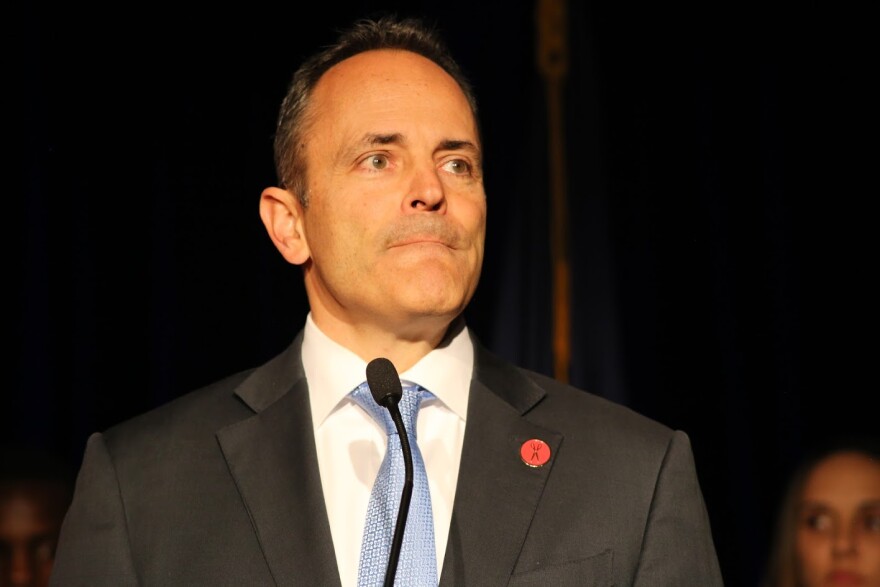Former Gov. Matt Bevin defended his last-minute pardon of a man convicted of repeatedly raping a nine-year-old during a radio interview on Thursday.
Bevin claimed that there was no physical evidence of the victim’s abuse because her hymen was still intact, echoing a myth that examining the small vaginal tissue can prove sexual activity, including rape.
On his last day in office, Bevin pardoned Micah Schoettle of Kenton County for rape, sodomy, incest and other offenses after serving 19 months of a 23-year sentence.
During the interview on WHAS, Bevin said that “there was zero evidence” against Schoettle.
“Both their hymens were intact,” Bevin said of the victim and her sister. “This is perhaps more specific than people would want, but trust me if you have been repeatedly sexually violated as a small child by an adult, there are going to be repercussions of that physically and medically.”
Medical experts say examining the hymen, a small vaginal tissue, is not a reliable way to prove sexual activity, including sexual assault.
But Bevin said that Schoettle should not have been prison based on the testimony of the victim.
“You should not be sent to jail based simply on the word — and uncorroborated word — of a single individual, especially when it is possible to verify that medically and physically and there were no ability to do so,” Bevin said.
The victim’s mother told WCPO last week that Bevin’s pardon felt like a “slap in the face.”
Dr. Melissa Currie, a forensic pediatrician at Norton Children’s Hospital, called the hymen claim a “widely-held myth.”
“The idea that penetrating sexual abuse must result in injury to the hymen has been disproven for decades. We know in the evaluation of child sexual abuse that the single most important piece of that investigation is the child’s statement, not the physical examination,” Currie said.
Rob Sanders, the Kenton County commonwealth’s attorney who prosecuted the case, said that Bevin “doesn’t understand child molesting cases.”
“We rarely have physical evidence in child molesting cases. We almost uniformly go to trial based on testimony alone, that’s just the facts of life when it comes to child molesting cases,” Sanders said.
Sanders has called for an investigation into Bevin’s pardons.
Lawmakers Consider Reining In Pardon Power
Bevin’s pardon of Schoettle was one of 428 pardons and commutations he issued in his final days in office.
Most of the pardons Bevin granted were the sort of clemency normally given by outgoing Kentucky governors — low-level drug offenders who had turned their lives around or cases widely thought to be miscarriages of justice.
But several of Bevin's pardons have drawn controversy, like that of Patrick Baker, who was convicted of murdering a Knox County man in 2018. Baker’s family held a fundraiser for Bevin last year and GOP mega donor Terry Forcht also advocated for his release, according to the Courier Journal.
Bevin was defeated by now-Gov. Andy Beshear by a little more than 5,000 votes on Election Day.
Both Republicans and Democrats have raised questions about Bevin’s pardons — Republican Senate President Robert Stivers called for federal officials to investigate the actions — and two Democratic leaders called for the state’s new Republican attorney general to investigate.
The power to pardon is in the Kentucky Constitution. Any changes to it would require a constitutional amendment, which would need to be approved by three-fifths of the members of each legislative chamber and then a majority of voters on Election Day.
Sen. Chris McDaniel, a Republican from Latonia, says he will propose an amendment to ban governors from issuing pardons in the weeks before and after an election.
“If a governor wants to use the power to commute and pardon, he should be willing to stand in front of the voters and be held accountable for those actions,” McDaniel wrote in a statement.
Controversial Pardons
Kentucky governors have often issued pardons in their final days in office, sometimes drawing controversy.
In 2015, outgoing Gov. Steve Beshear granted 201 pardons, 10 of which went to women convicted of violent crimes against abusive partners. He also granted pardons to many previous drug offenders.
Beshear pardoned Michael Bishop, who was convicted of shooting a 12-year-old in the back after the boy rang Bishop’s doorbell. WDRB reportedthat the victim’s family called Beshear’s pardon “reckless” and said Bishop hadn’t redeemed himself.
Beshear also pardoned Cheryl McCafferty who was convicted for killing her husband after he abused her. The Cincinnati Enquirer reported that the victim’s family was “disappointed and frustrated” by the pardon and the prosecutor in the case maintained that there was “no real evidence” that McCafferty had been abused.
Damon Preston, Kentucky’s chief public advocate, said that a governor’s pardons are always going to be controversial, but that the power is a necessary cure for a flawed justice system.
“Almost by definition a pardon is going to be against the public will,” Preston said. “Because the chief executive, and only the chief executive, has this power to look over the facts and say, 'In this circumstance I’m going to go against the public will because it’s the right thing to do.'”
Preston said he is worried that limiting the pardon power will have a chilling effect on governors using it.
“If you force that to be in advance of an election, you’re essentially telling the executive 'you will pay for this if you do it.' So the natural response is going to be, 'we won’t do it.' Which results in essentially the pardon power not existing,” Preston said.
On his last day in office in 2003, then-Gov. Paul Patton issued only one commutation — changing the sentence of a man on death row to life without parole.
At the time, Patton said he had determined about 200 pardon applications were justified but decided against granting them. Patton said then that issuing so many pardons “would have been unacceptable."

